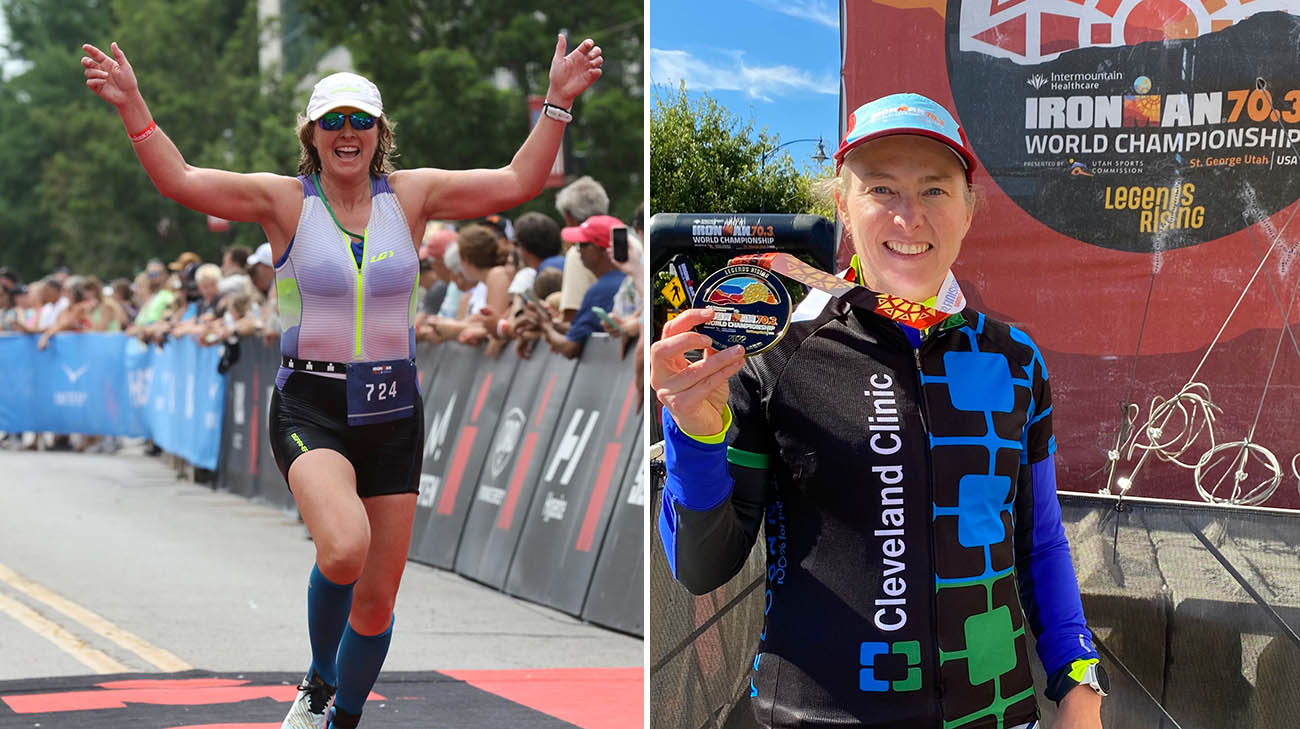
When she embarked on the final leg of the 2023 IRONMAN World Championship in Hawaii on October 14, 2023, 49-year-old Cleveland Clinic anesthesiologist Sara Whittingham, MD, looked back on her miles of progress to remember them marked by resilience, strength and intention.
By then, the 2.4-mile swim in the sparkling waters of Kailua Bay, 112-mile cycle through the lava fields of Queen K Highway and 26.2-mile run were nearly completed. But the mother of two teenage girls, who are runners themselves, wasn’t necessarily concerned with her time or placement as her arduous trek ended in quaint Kona town, on Hawaii’s Big Island.
Her journey was complex, but her goal was quite simple: finish the race.
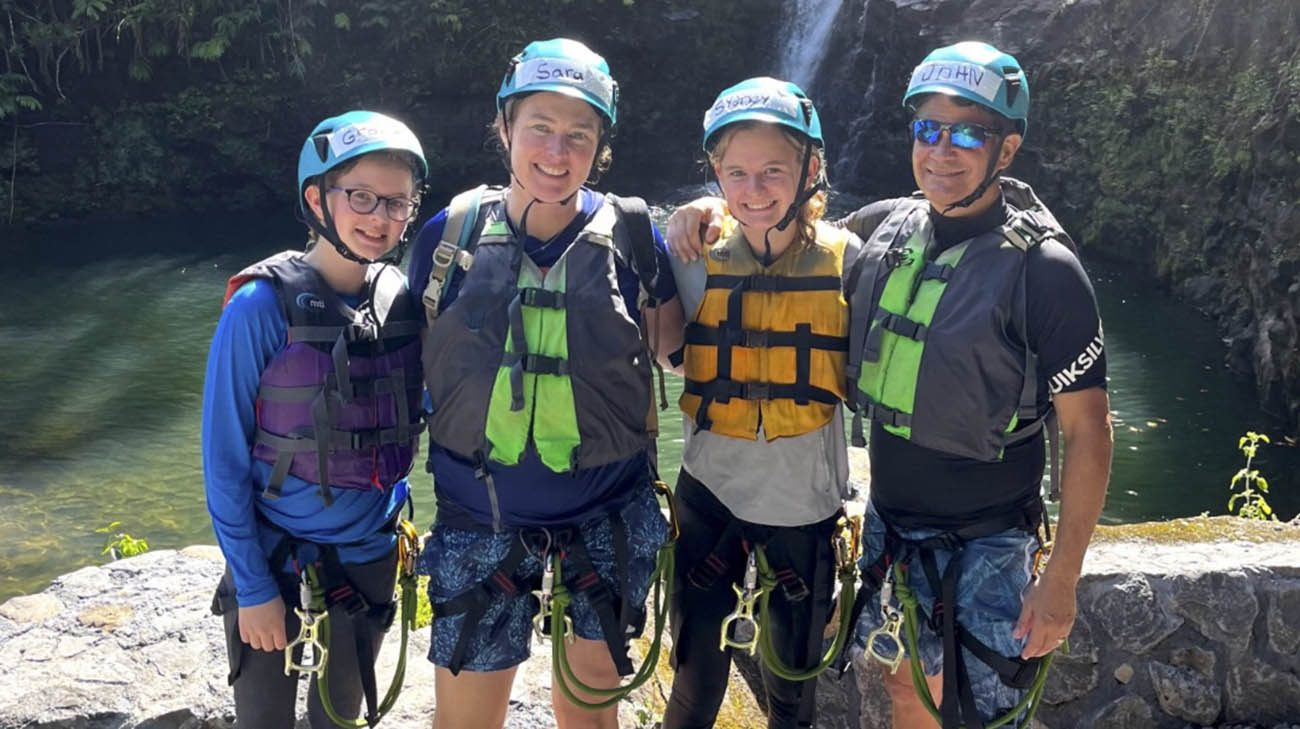
Sara with her husband and their two daughters. (Courtesy: Sara Whittingham)
“The whole week was epic,” says Sara, an Air Force Academy graduate and 20-year veteran, who was diagnosed with Parkinson’s disease in November 2020. “The friendships, the inspiring people, the anticipation, the excitement, the suffering, crossing the finish line and holding on with the help of new friends, family and friends, I'm so grateful to have had the opportunity to compete and help raise awareness for Parkinson's.”
A lifelong athlete, dedicated to fitness and exercise, Sara is an experienced marathoner and triathlete. In fall 2022, she completed a half triathlon in St. George, Utah, her first competition since beginning treatment for Parkinson’s, a degenerative brain condition best known for causing slowed movements, tremors and balance issues.
“I was pleased because I felt like a real runner again,” Sara recalls. “With medication and exercise, I wasn’t feeling as stiff. I was feeling better overall.”
After that race, she watched the annual IRONMAN World Championship on television like she typically does every year. However, this time she decided to write the organization a letter afterwards. Upon hearing Sara’s story and learning about how she uses a regimen of intense exercise and medication to slow the progression of Parkinson’s disease while maintaining her personal and professional interests, organizers of the 2023 IRONMAN World Championship offered her a highly coveted spot in the race, two months before the event.
“Training to get ready for an IRONMAN in just nine weeks is a little insane,” admits Sara, who joined the staff at Cleveland Clinic Marymount Hospital in June 2020, from a hospital in Utah, and one year after retiring from her position as a physician in the Air Force. “But I couldn’t say no to the invitation. It’s a once-in-a-lifetime opportunity to participate and to share my story to perhaps inspire others who are dealing with Parkinson’s.”
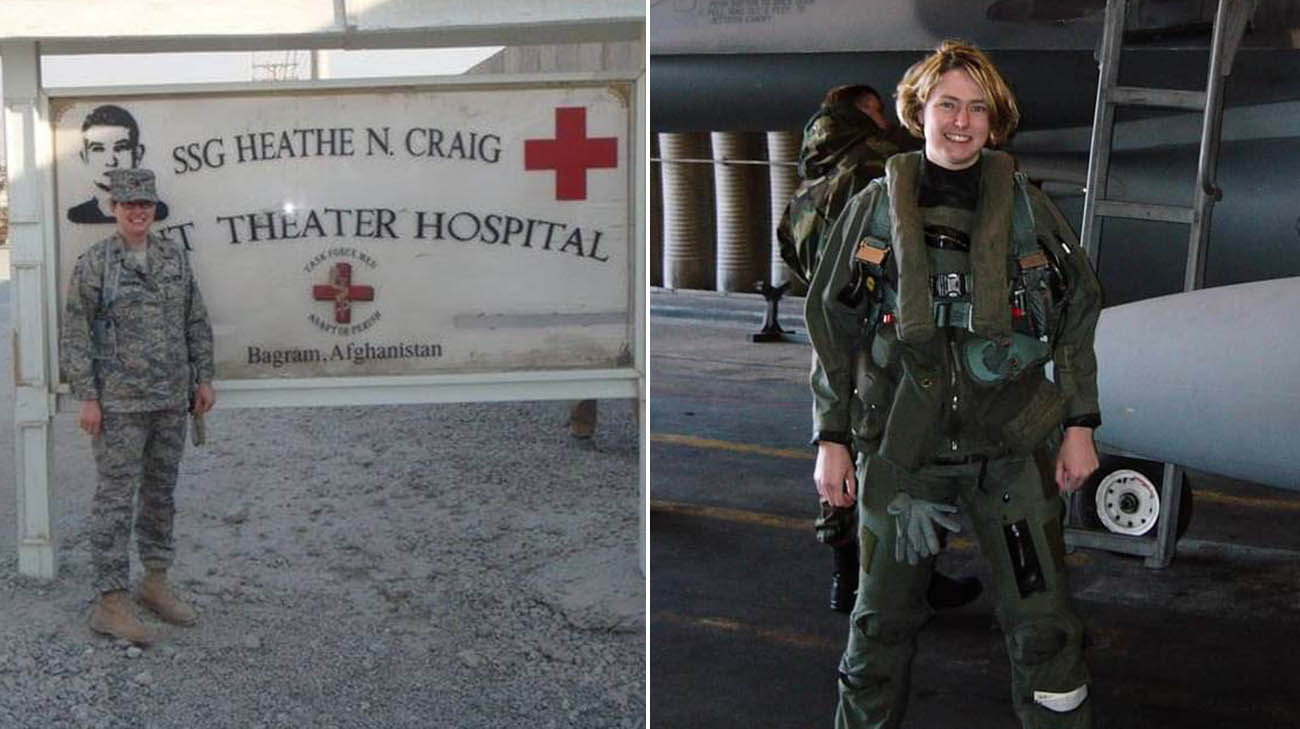
Sara is an Air Force Academy graduate and 20-year veteran. She was a physician in the Air Force Reserves from 2012 to 2019. (Courtesy: Sara Whittingham)
Her Cleveland Clinic neurologist, Benjamin Walter, MD, can attest to her diligence and positive attitude in managing the disease. He’s also grateful Sara is willing to tell her story and advocate for Parkinson’s treatment and research.
“Sara’s case is both touching and inspiring to all of us. To see her overcome the effects of her disease, and compete in an IRONMAN, is absolutely amazing,” says Dr. Walter, who specializes in medical and surgical treatment of movement disorders, including Parkinson's disease, dystonia and essential tremor. “She shows what people with Parkinson’s can do, when medicine and exercise work together.”
Parkinson’s is a progressive disease that currently has no cure. Symptoms typically develop gradually. By the time Sara noticed a persistent tremor in one arm, in November 2020, the disease had likely been slowly affecting her body.
“I took it very hard. I kept thinking, ‘I’m going to be a disabled person, very soon.’ But the more I learned, the more I realized its effects can be slowed. And when Dr. Walter gave me a list of Cleveland Clinic research studies for Parkinson’s, I saw many involved exercise. That’s right up my alley.”
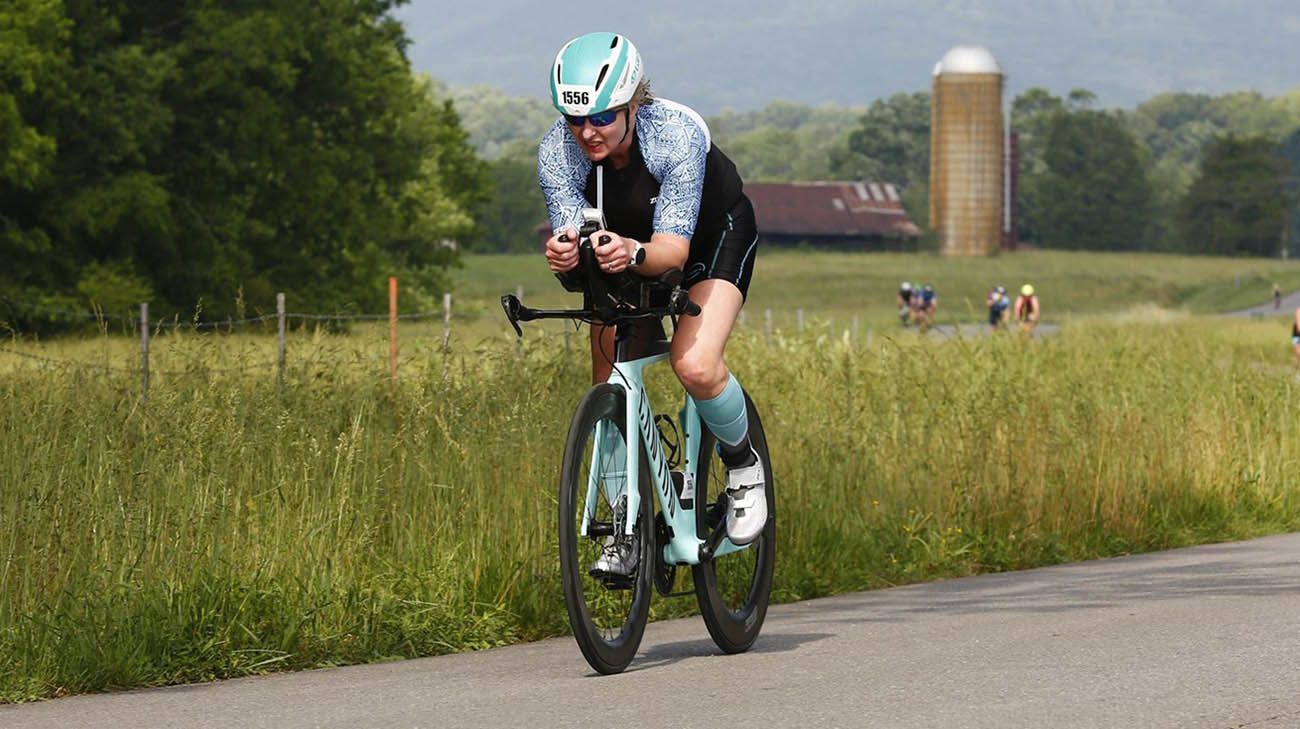
Sara is an experienced marathoner and triathlete. (Courtesy: Sara Whittingham)
Sara applied for and was accepted in one of the research studies being led by Jay Alberts, PhD, a researcher at the Cleveland Clinic Lerner Research Institute’s Department of Biomedical Engineering. The study called CYCLE (CYClical Lower Extremity Exercise for Parkinson’s trial) required Sara and other randomly chosen participants to use an exercise bike, at home, to determine if long-term, high-intensity aerobic exercise can slow the advancement of Parkinson’s.
The study has revealed promising results, and Sara has no doubt it is working for her. Before beginning both Parkinson’s medication and the CYCLE study, Sara was noticing her body was becoming stiffer, she had gained 30 pounds and was experiencing other complications. After one year of exercise bike training, she says, “The more I rode, the better I felt, and the more I wanted to ride.”
To prepare, Sara would arise at 4:30 a.m. to work out for the IRONMAN competition and would add in more repetitions of swimming, weight training, running and cycling after work and on weekends. Sometimes, she would be accompanied by her husband, John Langell, MD, who is president of the Northeast Ohio Medical University (NEOMED) and an advocate for Parkinson’s research being undertaken there.
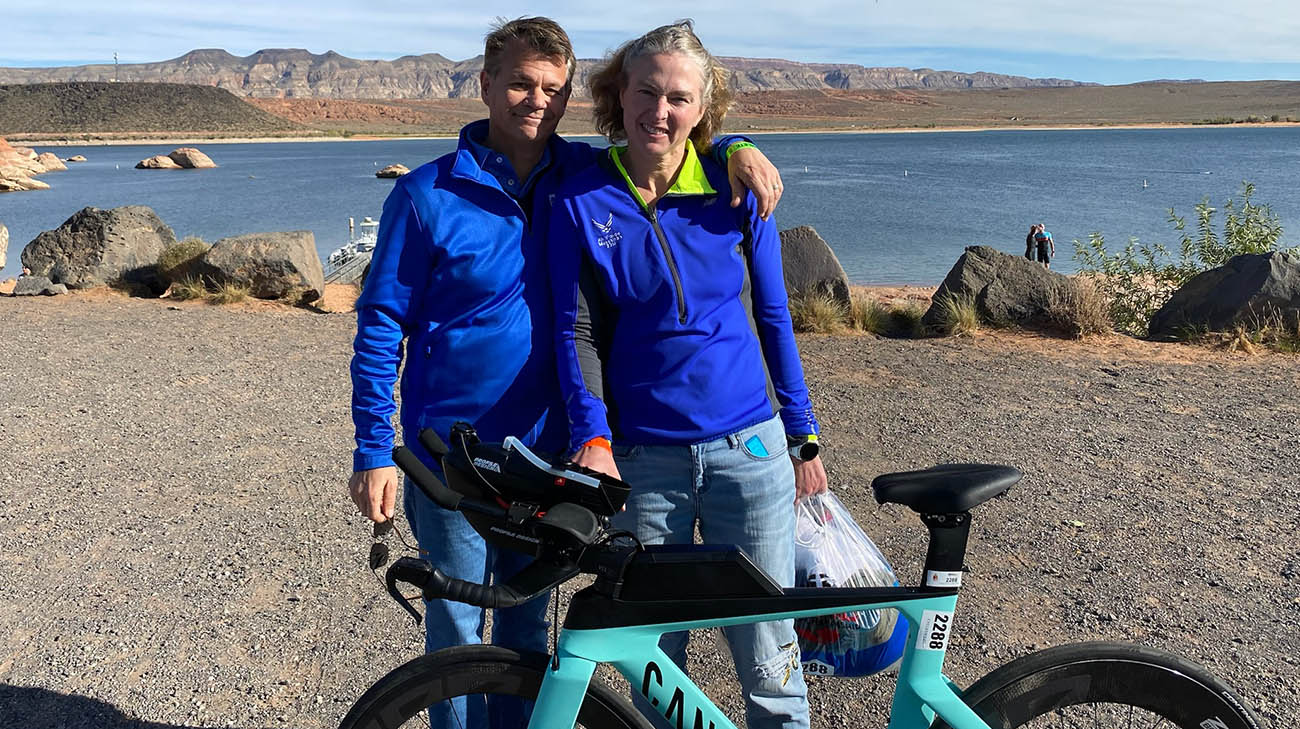
Sara is grateful for her strong support system, including her husband, John. (Courtesy: Sara Whittingham)
Sara hopes awareness surrounding her IRONMAN participation, and other ongoing advocacy, will inspire people with Parkinson’s to seek out exercise-included treatment options, while also furthering support for Cleveland Clinic and NEOMED research. She’s also eager to promote the work being done by InMotion, a community-based nonprofit that provides free evidence-based exercise, arts, support and education programs for people with Parkinson’s.
"With the support of my family, friends, colleagues and my care team, I have gone from starting to apply for disability in January 2022 to competing in an IRONMAN in October 2023,” Sara says. “There are thousands of men and women who are still working and living full lives with this disease. I hope that gives people with Parkinson’s hope to never stop dreaming big.”
Related Institutes: Neurological Institute

